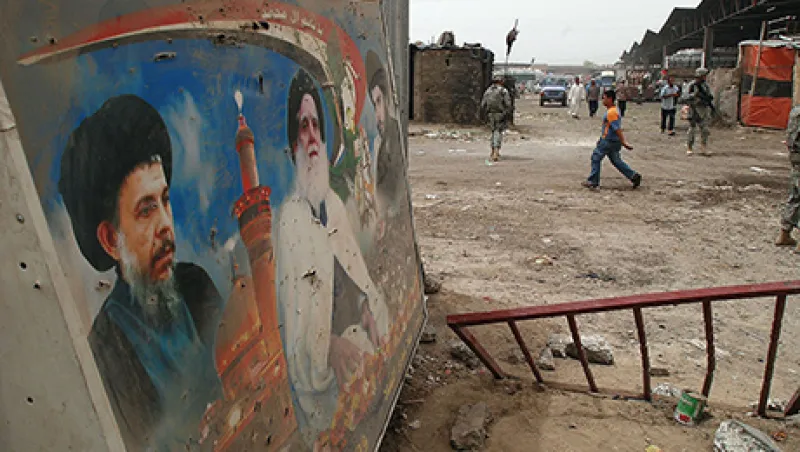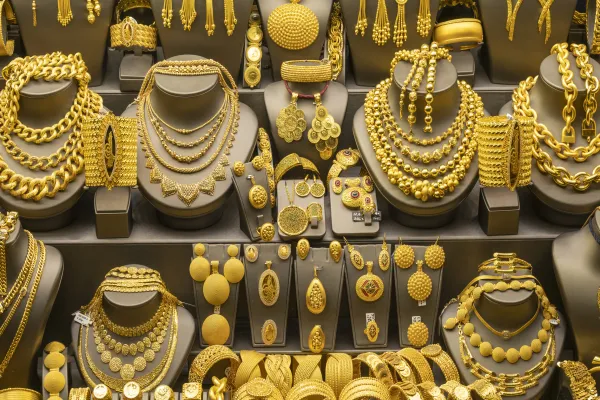June was a tricky time for Chicago-based Frontaura Capital, an investment firm with a focus on public equities in frontier markets. At the beginning of the month, Frontaura had allocated 6 percent of its $170 million in assets to Iraqi equities. As the Islamic State began its dramatic advance across eastern Syria and into northern Iraq, after establishing itself in Syria in 2013, global investors pulled much of their money out of Iraq. The perilous security situation was compounded by a political crisis, with Nouri al-Maliki, the incumbent prime minister, refusing to step aside in the days leading up to his eventual resignation August 14. Frontaura faced a choice: Stay or go? The firm wrote to investors in early July to let them know it was getting out of Iraq: “We have reduced the size of our basket there from above 6 percent of our fund to below 1 percent.” The firm’s next investor letter, at the beginning of August, read, “Our Iraq exposure now rounds down to 0 percent.”
A few days later, U.S. President Barack Obama announced that the U.S. would launch air strikes in northern Iraq to help the Iraqi army and local militias push back the Islamic State, which had begun to encroach upon Erbil, the capital of the Kurdish autonomous region. August 11 saw the appointment of Haider al-Abadi as the new prime minister, and the market immediately rallied. The Iraq Stock Exchange’s benchmark, the ISX General index, which had plummeted through June and July as the Islamic State advanced, rebounded almost 16 percent between August 11 and September 16.
A year ago, Iraq had seemed poised for sustained, spectacular growth. The security situation had stabilized. Asiacell, Iraq’s leading mobile phone company by revenue, had just completed a $1.3 billion initial public offering on the ISX, the largest public share sale in the Middle East since 2008; and there was much speculation that a global custodian bank was about to set up a local branch, thereby making the country investable for large foreign institutional investors. The march of the Islamic State means that much of the goodwill around Iraq’s progress has now evaporated. Yet some frontier-markets investors remain unperturbed, even as many acknowledge that recent turmoil means Iraq is unlikely to achieve mainstream investor acceptance anytime soon.
Nick Padgett, managing director of Frontaura, says he doesn’t regret the decision to get out. “Even though things have improved over the last month, it’s a fluid enough situation that no one knows how things will turn out and whether buying, holding or selling Iraq will prove to be the right strategy,” he explains. Many global investors who held positions in Iraq at the beginning of the year appear to agree. Over the past couple of years, foreigners have usually accounted for between 10 percent to 15 percent of daily trading volume at the ISX, according to Grant Felgenhauer, principal at Euphrates Advisors, which runs a New York–based investment fund focused exclusively on Iraq. In the past three months, foreign participation in the market has fallen to 7 percent on average.
That withdrawal hasn’t dampened the enthusiasm of funds with an exclusive focus on Iraq, though. “We embrace the volatility,” says Felgenhauer, whose fund is sticking to its guns despite seeing its asset base fall to $85 million today from $110 million in May. “If other funds want to get out, that’s an opportunity for us.” In Felgenhauer’s view, Iraq has gone from promising returns of 30 to 40 times invested capital over the next decade — similar to Russia from the early 1990s to 2008 — to a return multiple of 10 to 20. “It’s a less spectacular story now, but from a risk-reward perspective, it’s still extremely compelling,” he says.
The investors who have stayed behind were, they say, never threatened in any serious way by the Islamic State’s incursions: Most of Iraq’s population, companies and wealth are concentrated in cities in the south and the north, whereas the Islamic State occupies a patchwork of roadways and cities across a vast swath of underpopulated territory in the country’s center that has little to no bearing on the operations or profits of the ISX’s most popular, liquid names, which include the Bank of Baghdad, Kurdistan International Bank and Baghdad Soft Drinks Co. “Our investors understand the risks,” says Philip Khoury, partner and portfolio manager of Impera Capital, an Istanbul-based boutique asset management firm that runs a $5 million fund focused exclusively on Iraq. “We’ve had no pressure for redemptions, and we expect no pressure in the months ahead.”
The real economy has suffered in the face of the radical-Islamist threat. Felgenhauer concedes that “ordinary Iraqis are not out there spending money. They’re staying home, and that’s a problem.” But it’s only a short-term problem, he says, adding that from a trading perspective, volatility at the ISX, which has a total market capitalization of $10 billion and average daily turnover of between $2 million and $5 million, has offered considerable short-term buying opportunities. Euphrates, which holds shares in just 12 companies, is in the process of adding to its portfolio a bank in the Kurdish autonomous region. Previously, the bank, which Felgenhauer won’t name because the firm has yet to finalize the stock purchase, had been “expensive as hell, but now, with ISIS in Kurdistan, it’s traded off quite a bit,” he says.
In the longer term, developments over the past week, which have included the Iraqi parliament’s approval of the appointment of al-Abadi as prime minister and Obama’s announcement of an enhanced international effort to “degrade and destroy” the Islamic State, have given investors still in Iraq further cause for optimism. “The thesis is back on track,” says Khoury. That thesis holds, broadly, that Iraq is one of the few frontier markets with genuine China-like growth prospects over the next decade. It’s not only Iraq bulls making the case. The World Bank expects gross domestic product to increase 5.9 percent this year and 6.7 percent in 2015. Private sector forecasts are more optimistic still, with Citigroup projecting growth at 10.3 percent this year. The bullishness of these forecasts rests, above all, on Iraq’s abundant reserves of cheap, easily accessible oil; once extracted, oil should generate liquidity, which will in turn flow back into local businesses, thereby driving a virtuous circle of growth and investment. Or so the theory goes.
“Iraq has had decades of stagnation,” says Khoury. From 1980 to 2008 a series of brutal wars — first against Iran; then against the U.S., twice; and, finally, the periods of quasi–civil war that have raged since the mid- to late 2000s — coupled with the impact of global economic sanctions, meant there was virtually no investment in the country. Plentiful oil and the logic of base effects mean that “it’s only a matter of time before this country becomes as wealthy as its neighbors, like Saudi Arabia, Qatar and the United Arab Emirates,” predicts Shwan Taha, chair and sole owner of Baghdad-based brokerage house Rabee Securities.
That assumes, of course, that “this country” will stay together as a country. The Islamic State has succeeded in effectively erasing the border between Iraq and Syria, and the terrorist group’s ascendancy, coupled with ongoing political dysfunction in the management of relations between the country’s Shia majority and Sunni and Kurdish minorities, has revived the broader question of whether Iraq will or should continue to exist as a unified state.
Investors, on the whole, seem untroubled by the prospect of state disintegration. Iraq “could fall apart and be ruled by a dictator and our thesis would still hold,” says Felgenhauer, assuming the companies investors are interested in would continue to exist and continue to cater to the same market. Besides, he adds, “some of the best bull markets in history have been dictatorships.” Overall, however, investors think it is unlikely the country will break up. “Too many people are invested in Iraq working,” argues Taha. “There are chains of dependency between the different groups that mean it will always make more sense to stick together than fall apart.” In a sense, the rise of the Islamic State has had a “silver lining” for Iraq’s political system and for the market in that it has focused people’s attention on solving long-standing problems such as full Kurdish autonomy, sectarian power-sharing and the equitable federalization of oil revenues, adds Felgenhauer.
Much hope is invested in the new government under al-Abadi, who has pledged to run the country in a more inclusive fashion than his predecessor did. Throughout his eight years in power, al-Maliki pursued an aggressive policy of ridding government and the public service of former members of Saddam Hussein’s Baath Party, and was accused of favoring the Shia majority. Al-Abadi has struck all the right conciliatory notes in his opening days in power, but skepticism remains among many in Iraq’s minorities that the new prime minister will remain true to his pledge to govern for all.
Investors have cheered the appointment of the 62-year-old, who holds a Ph.D. in electrical engineering from the University of Manchester, not least because he was one of the key figures in the economic reconstruction of the country following the ouster of Saddam and pushed, from 2006, for foreigners to be allowed to enter the local market. But al-Abadi belongs to the Dawa Party, the same highly partisan Shia party as al-Maliki. His resentment toward Baathists runs deep, dating from the death of two of his brothers in the early 1980s, which al-Abadi claims was the work of Saddam’s forces. “We really don’t have clarity on whether he will truly govern in a more inclusive style,” says Khoury.
Lack of political certainty aside, absent a wholesale occupation of Baghdad and the country’s south by the Islamic State, don’t expect the bullishness of those still trading in Iraq to change anytime soon. “This is not the first time we’ve had bad news in Iraq,” says Taha. “I’ve been hearing bad news on Iraq since I was born. There will be more doom and more violence to come; life will go on.”
Follow Aaron Timms on Twitter at @aarontimms.






